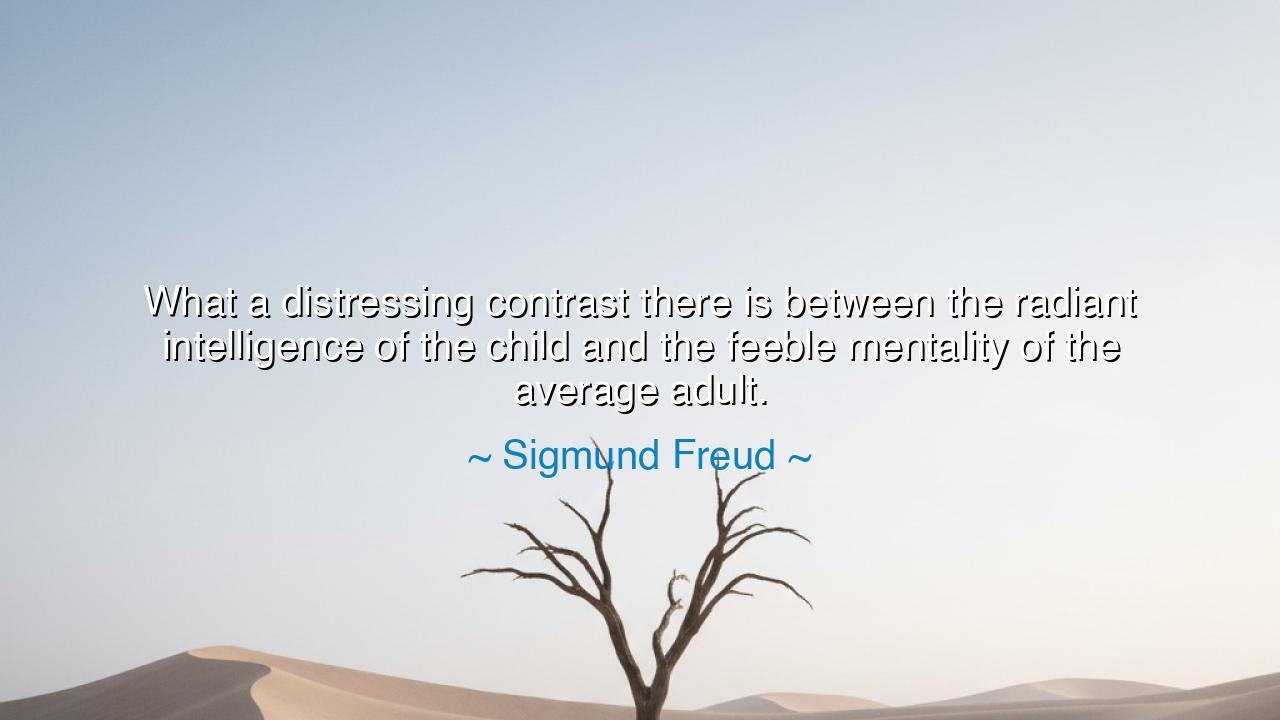
What a distressing contrast there is between the radiant
What a distressing contrast there is between the radiant intelligence of the child and the feeble mentality of the average adult.






In the chambers of thought where wisdom and wonder intertwine, Sigmund Freud—the father of psychoanalysis—once lamented: “What a distressing contrast there is between the radiant intelligence of the child and the feeble mentality of the average adult.” These words, though born from a scientist of the mind, sound like the sorrow of a philosopher watching the light fade from human eyes. Freud saw what many overlook: that the child, in its purity of perception and imagination, often possesses a brightness that adulthood dims with fear, conformity, and routine. His quote is not a condemnation of maturity, but a lament for the lost freedom of thought that once danced in every mind.
To understand his meaning, one must first see how Freud viewed the human spirit. He believed that the child is the origin of all that is creative and instinctive in the psyche. The child questions everything, imagines infinitely, and accepts contradiction without shame. In youth, thought is not yet enslaved by society’s rigid logic; curiosity still burns unafraid. But as life presses its expectations upon us, that radiant intelligence—the spontaneous wisdom of wonder—wanes. We trade questions for certainty, imagination for practicality, and courage for caution. Thus, in Freud’s words, the tragedy of civilization is revealed: that the price of social order is often the death of inner brilliance.
The feeble mentality of the average adult that Freud speaks of is not stupidity—it is the dullness of those who have stopped seeing. It is the weariness of one who no longer asks “why?” or “what if?” It is the blindness of those who see the world only through habit. Adults often mistake experience for wisdom, but without imagination, experience becomes mere repetition. The child, though ignorant of the world’s laws, possesses something greater—the sacred power of curiosity, which awakens new worlds with every question. The adult, certain of all answers, ceases to grow.
Consider the story of Albert Einstein, who once said that “imagination is more important than knowledge.” As a boy, he would spend hours pondering how it might feel to ride upon a beam of light. That childlike wonder became the seed of his greatest discoveries. The world called him a genius, but he was simply a man who had never abandoned the intelligence of his inner child. He proved what Freud had seen: that true genius is not the accumulation of knowledge, but the preservation of wonder.
Freud’s insight also speaks to a moral truth. For the child’s intelligence is not only radiant because it imagines—it is radiant because it feels. The child’s empathy, openness, and honesty reflect an intelligence of the heart that adults too often smother. In pursuing success, reputation, or control, we become guarded and mechanical. We speak wisely but act timidly. Freud’s contrast is therefore both intellectual and spiritual: the child’s mind is alive; the adult’s, domesticated. What we call “maturity” often conceals the slow surrender of vitality.
Yet Freud’s lament is not without hope. For though the adult may lose the child’s clarity, he may also choose to recover it. The ancients taught that wisdom lies not in forgetting one’s youth, but in integrating it. The philosopher who can think with the rigor of reason and the imagination of a child is closest to enlightenment. To reclaim that radiance, one must unlearn as much as one learns—question again, dream again, and marvel again at the ordinary miracles of existence.
So, my children of tomorrow, remember this: do not let the fire of your childhood intelligence be smothered by the ashes of conformity. Stay curious even when the world tells you to be practical; stay imaginative even when it calls you foolish. For the truest wisdom is not found in the cautious mind, but in the wondering soul. The child sees the world as possibility; the adult sees it as limitation. Choose always to be among the radiant ones—those who grow wiser without growing dull, older without losing wonder.
And when you look upon the world with open eyes and unguarded heart, you will understand Freud’s lament not as despair, but as a challenge. The intelligence of the child is the light of creation itself—your task is not to outgrow it, but to protect it, nurture it, and let it shine until your final breath.






AAdministratorAdministrator
Welcome, honored guests. Please leave a comment, we will respond soon